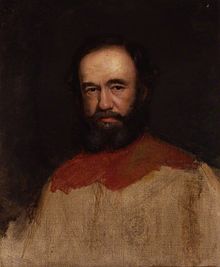James Outram (General)
Sir James Outram, 1st Baronet GCB KSI (born January 29, 1803 in Butterley Hall near Ripley , Derbyshire , † March 11, 1863 in Pau ) was a British general and the son of Benjamin Outram .
Outram joined the British East India Company as a cadet in 1819 and took part in the First Anglo-Afghan War between 1838 and 1840 . He became a British agent in Sindh and came to the court of Gaekwar of Baroda in 1847 . The openness of his appearance to various measures of the East Indian government prompted his removal from Baroda.
He then went to England , but later returned to India , where he became resident of Lucknow in 1854 . In 1856 he ended the annexation of Awadh , was promoted to lieutenant-general in 1857 and appointed commander-in-chief of the British army in the war against Persia . Outram won at Khushab on February 8, 1857, he captured Mohamera on March 26 , whereupon Persia asked for peace. He played an essential role in suppressing the Indian uprising of 1857 . He was not involved in the reconquest of Kanpur . However, he arrived there in September 1857 and brought substantial reinforcements with him. On September 18, he broke out of there to liberate the garrison town of Lucknow . In a gallant gesture, he ceded high command to Sir Henry Havelock , who had freed Kanpur and had won several decisive victories in his first attempt to liberate Lucknow. The British troops suffered such heavy losses as they marched on Lucknow that they were unable to evacuate the besieged garrison. Instead, together with the people trapped there since June, they defended the garrison until troops led by Sir Colin Campbell were able to liberate the city in mid-November . James Outram then became a member of the highest government agency in Kolkata (Calcutta) after the Government of India Act 1858 ended the rule of the British East India Company over the Indian subcontinent and British India became a crown colony. However, he returned to England in 1860.
For his services he was made Knight Commander of the Order of the Bath (civil department) on February 5, 1856 and on July 30, 1857 to the Knight Grand Cross of the Order of the Bath (military department), on November 10, 1858 to hereditary Baronet , of Bengal in India, and he was one of the founding members of the Order of the Star of India on June 25, 1861 as Knight Companion .
From his 1835 marriage with Margaret Clementina Anderson († 1911) he had a son and heir, Sir Francis Boyd Outram, 2nd Baronet (1836-1912).
Publications
- Notes of the campaign in Scinde and Afghanistan. London 1840.
- The conquest of Scinde. London 1846.
literature
- Outram, Sir James . In: Encyclopædia Britannica . 11th edition. tape 20 : Ode - Payment of Members . London 1911, p. 381–382 (English, full text [ Wikisource ]).
Web links
- Lt.-Gen. Sir James Outram, 1st Bt. On thepeerage.com
| predecessor | title | successor |
|---|---|---|
| New title created | Baronet, of Bengal 1858-1863 |
Francis Boyd Outram |
| personal data | |
|---|---|
| SURNAME | Outram, James |
| ALTERNATIVE NAMES | Outram, James 1st Baronet (full name) |
| BRIEF DESCRIPTION | British general |
| DATE OF BIRTH | January 29, 1803 |
| PLACE OF BIRTH | Butterley Hall at Ripley , Derbyshire |
| DATE OF DEATH | March 11, 1863 |
| Place of death | Pau |

